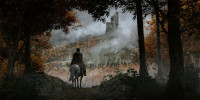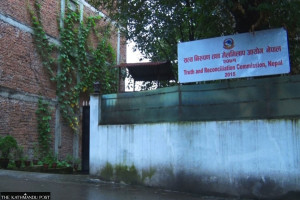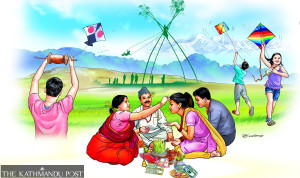Fiction Park
Mother
And when sunlight shone on her face, she looked beautiful and I could not believe she was no longer breathing the vital air. She had retreated into silence, never to be bothered again
Pramithas Dhakal
When I was a small boy, my whole life was centered on my mother. I was mamma’s boy, as people would say. I would follow her wherever she went. I especially loved going with her to the forest to collect firewood. I did not collect any wood, of course, but wandered in search of wild berries or sat beside the nearby brook watching tiny fishes dance. “Don’t go too far,” she would shout. We would then return in the evenings and along the way I loved watching our giant shadows. Because she carried a huge pile of wood on her back and the evening shadows were long and slanted, her shadow reminded me of the funny monster in one of the stories my sister had told me. And I would giggle.
She was a tough woman. She never kissed me on my cheeks or said that I was her little doll. but she loved me more than her life. She loved me in her own way and it was warm.
The ambulance suddenly stopped. It was so dark that I could barely see my own hands. The driver turned on the lights and I saw that it was already ten. I saw a long line of vehicles ahead of us. I could count ten or twelve of them and the rest were just endless flecks of glowing indicators winding in the darkness. I got out to the smell of charcoal in the air. On making some enquiries, we found out that a bus owner had beaten up a driver over some money issue and the drivers had blocked the road in protest. The road was not likely to be opened that night.
I went inside the vehicle. She lay there, on her hard, uncomfortable bed. I took a handkerchief and wiped away the perspiration from her face. She slowly opened her eyes and looked at me feebly. “How are you feeling, Mother?” She did not reply or maybe she did not hear me. But her eyes told me a gigantic rock was hooked to her heart and it was pulling her down in to the darkness but she was too numb to feel the pain or too weak to fight it back. For me it was a sinking feeling.
She used to often tell me tales of her childhood and about the hill where she was born and brought up around. She remembered her mother fondly. “Father died when I was very young. I can barely remember his face. But my mother…she was beautiful.”
She had once told me about her marriage. She was only eleven when she was married to my father—just a child. When the wedding rituals were underway, she had remembered games she had played with her friends in the backyard. And what drew her attention the most was the fascinating dress she was wearing on the occasion and of course the beautiful red bangles her mother had bought for her. A thin and tall man was sitting beside her at the mandap. He was her to-be husband, with whom she was going to spend the rest of her life. She looked at him and saw that he was the same age as one of her uncles. He smiled at her. But she did not smile back. She did not like him very much.
She was not old enough to actually understand what marriage meant, but she was aware of the fact that she would soon be leaving her home and her beloved mother forever. She was very scared. So when the janti were preparing to return, she tried to run away. She could neither outrun her fate nor the people chasing her, all the while asking her to stop. They caught her eventually.
She was my father’s second wife. He had remarried after his first wife had died. Father had loved her dearly and her death had come down hard on him. Nonetheless, he loved my mother and she was a good wife too. But it did not last long. Maybe it was his subtle mourning for his wife that had, eventually, resurged violently to the surface or was it some disease or a hormonal imbalance of some sort; he lost his sanity in the prime of his life.
He started hating my mother and always taunted her, telling her that he would soon marry a younger and a more beautiful girl. She was too proud not to be wounded by his hurtful words and unfortunately too young to understand his real condition. She never forgave him for that. When he was finally admitted to a hospital, the doctors gave him a powerful tranquilizer that kept him in bed for the rest of his life. He rarely spoke to anyone after that and spent the rest of his days in isolation. He never asked for her forgiveness and never got one from her. But when he died, she clutched at his body and cried bitterly.
It was past midnight and the night was as silent as the heart of the dead. Mother was not looking so good. She needed immediate medical care but there she was, in the middle of the road, helpless as life slowly seeped out of her. I clasped her skinny hands and asked, “How are you feeling, Mother?”
“My breath is heavy and sleep hovers over my eyes. Now the desire to sleep has surpassed all fear and pain,” she replied, eyes shut all the while.” You suffered all your life, Mother, and now you were going to die in this place amid strangers far away from home. It was not fair. I realised how we had become prisoners of fate, dancing our pathetic little dances, synced to his drum-beat. “We will go from here first thing in the morning. The word around here is that the road will be opened by then.”
“Take me home, son,” she said. “If the Gods do not forbid, I want to see the place one last time before I die. I want to rest where he is resting…” Her voice was as solemn as the sullen autumn sky. I looked at her face and took her hand in mine—the hands that had fed me throughout my life, the coarse and skinny hands that were gradually getting colder now.
The first flecks of sunrays were sneaking from beyond the eastern hills, and the darkness was slowly retreating. And when sunlight shone in her face, she looked beautiful and I could not believe she was no longer breathing the vital air. She had retreated into silence, never to be bothered again with life’s tiresome endeavours.
Thousands of lives have sprung on earth, all who’ve run their brief courses and then have vanished away. The earth is a lively arena where hundreds of dramas of all sorts unfold every day. And the earth has various tasks to perform too. The tasks of creating days and nights, winters and springs, a colourful platform for lives to flourish on and an eternal shore for the dead to limp around on. The earth did not mourn for my mother. It just had no time.
The strike was over and the road now possessed life through the voices of people and the sounds of engines. People were excited to resume their journey. It had been a long night but the morning gave ample sunshine to melt away the remnants of the cold the night had bestowed upon my heart to some extent. I was sad, of course, for my mother, but was relieved somewhat that she was now free of suffering or pain. As we started to move, a long row of vehicles were passing us from the opposite direction, heading towards their own destinations. “We all have our destinations,” I thought. “And she has gone to hers.” Her thin grayish white hair was fluttering in the breeze that rushed in through the window and she looked as if she was flying.
I reached towards her. I covered her face with my palm and muttered a silent prayer.




 19.19°C Kathmandu
19.19°C Kathmandu










